Helen Sword: E.B. White's writing is "Flabby"
« previous post | next post »
A post by Joe Fruehwald ("To take "Zombie Nouns" seriously, you must've had your brains eaten", Val Systems 11/27/2012) motivated me to take a second look at Helen Sword's ideas about style, which I discussed earlier in "The Redemption of Zombie Nouns", 7/26/2012. In particular, I decided to take her "Writer's Diet Test" out for a spin.
For test material, I choose a few selections from E.B. White, co-author of The Elements of Style. Although we've occasionally expressed skeptical and even negative opinions about The Elements of Style, I have nothing but admiration for E.B. White as a writer. And so I was distressed to learn that Ms. Sword consistently judges his writing to be "Flabby". [Update — In fairness I should note that she gives her own writing the same evaluation…]
I started with a passage from The Wild Flag, previously quoted in "The blowing of each other up", 2/18/2005:
So I tried a passage from a letter to J.G. Case, White's editor at Macmillan for The Elements of Style, dated 17 December 1958, previously quoted in "No smooth ride is as valuable as a rough ride", 2/19/2005:
Continuing to comb through our archives, I found a passage from White's 1976 Introduction to his collected letters, quoted in "Passive aggression", 7/18/2006:
Turning to the New Yorker's archives, the first thing the index handed me was a passage from an open letter to Clare Luce, published in The New Yorker, March 20, 1943, p. 15:
The second hit was a comment from The New Yorker, July 1, 1944, p. 13:
At this point, I decided that a pattern had been established, and took the Writer's Diet Test back to the dealer, having decided not to buy one. Quoting Joe, who puts it very well:
Ain't nothing like exploiting the collective dysmorphia of a nation to push your quarter-baked usage decrees. But in doing so, Sword actually clarifies the role that books like hers play. The analogy to the diet and weight loss industry is entirely apt. The dieting industry makes their money by sowing seeds of personal insecurity, then reaps their harvest with offers of unfounded, unscientific, and ultimately futile dieting pills, products, methods, 10 step plans, meals, regimes, books, magazines, etc.
I won't mince words. The NYT column and the TED-Ed video have the equivalent intellectual content of the magazines in the supermarket aisle promising you 5 super easy steps to trim your belly fat to get a sexy beach bod in time for the summer. And they serve the same purpose: to undermine the confidence of every-day folk, so that they may be taken advantage of by self-appointed gurus.
Update — beating the dead horse a bit, we see that the first two paragraphs of William Strunk's 1918 Elements of Style score in "Heart Attack" territory:
It's amazing that apparently intelligent people (the editors of the New York Times, whoever books TED talks, etc.) take this malarkey seriously.
Update #2 — By popular demand, here are the Writer's Diet Test results for the abstract of Helen Sword, "Writing higher education differently: a manifesto on style", Studies in Higher Education 34(3) 2009:
And I can't resist noting that the Declaration of Independence is also "Flabby":
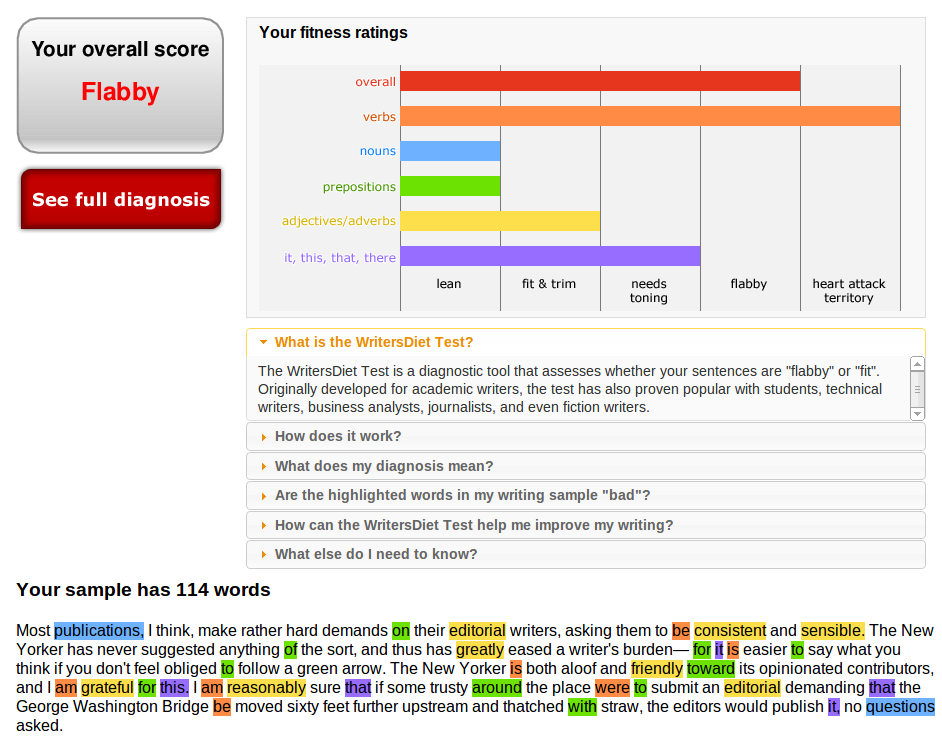
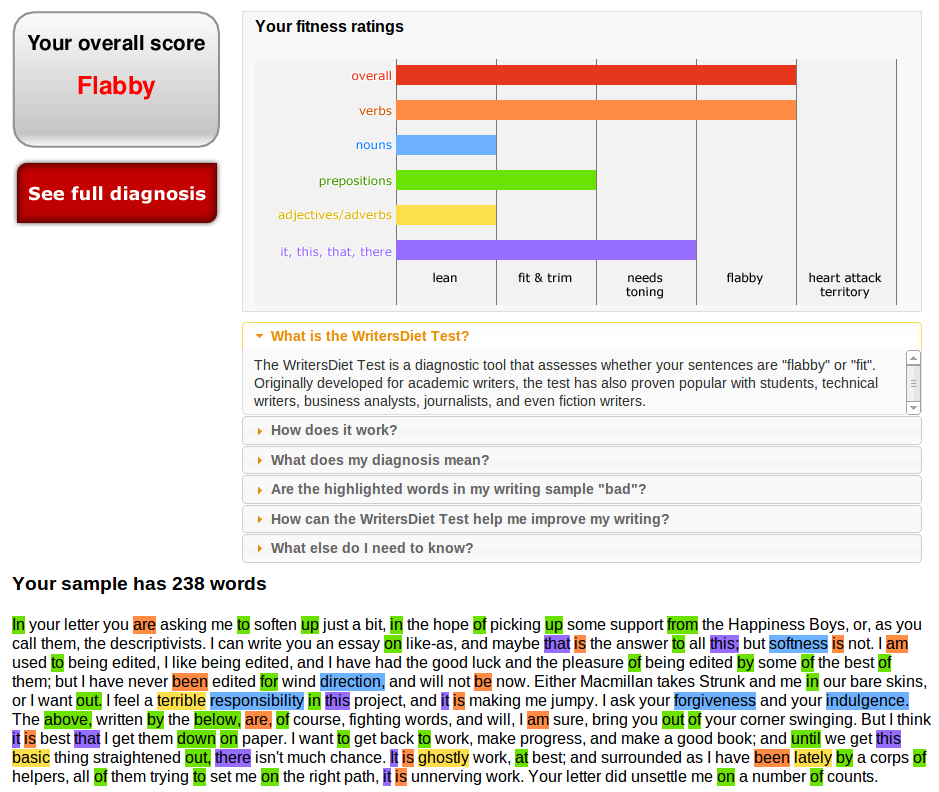
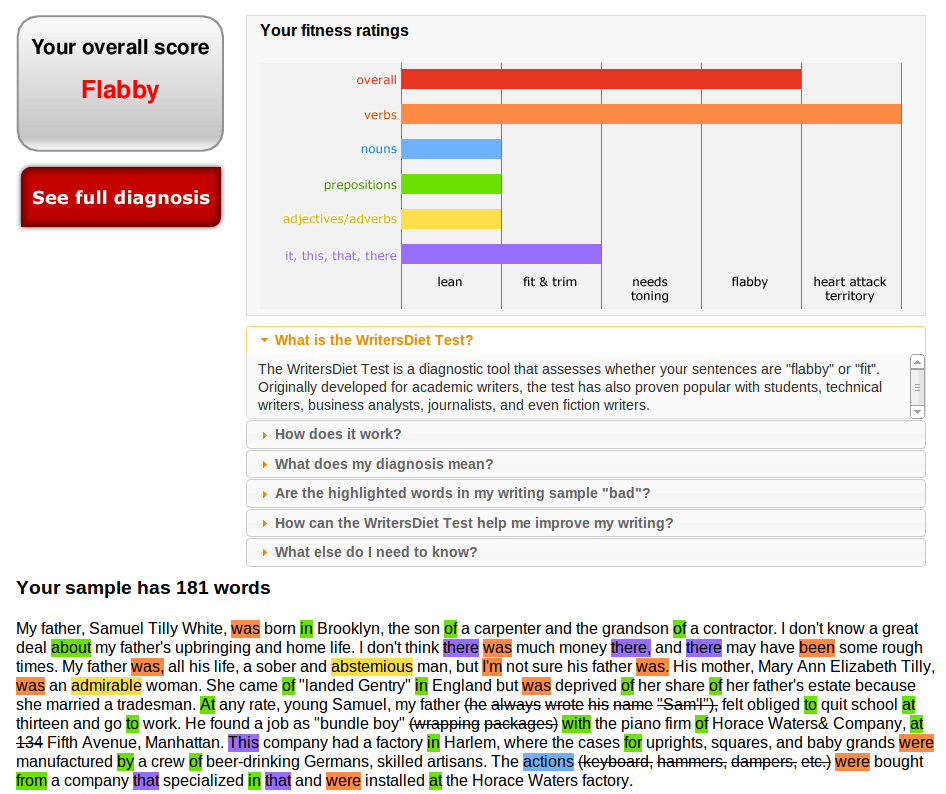
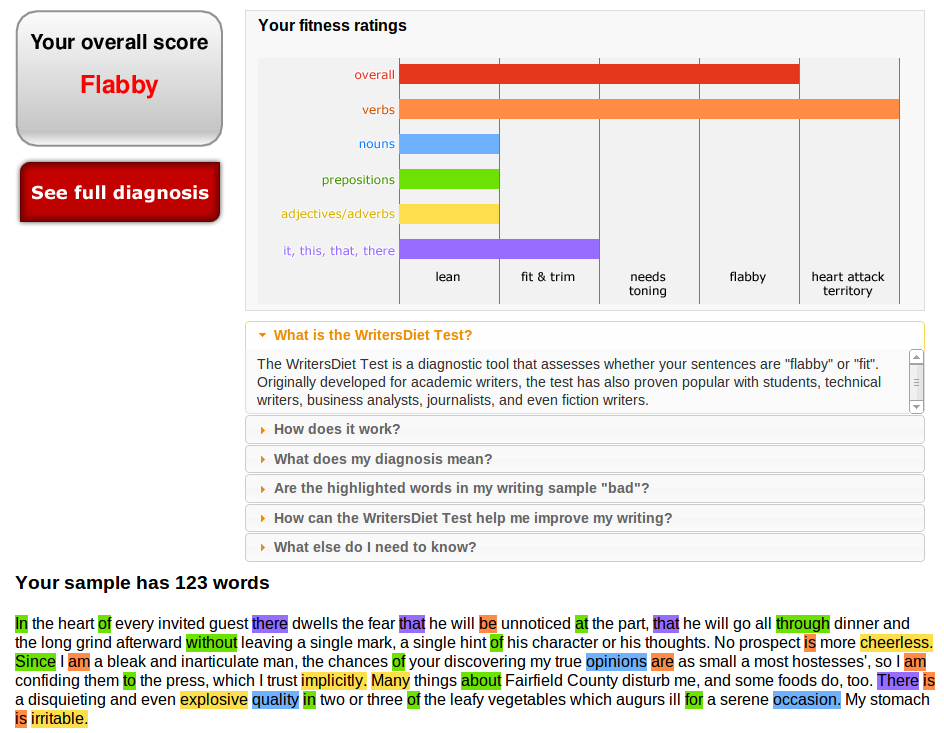
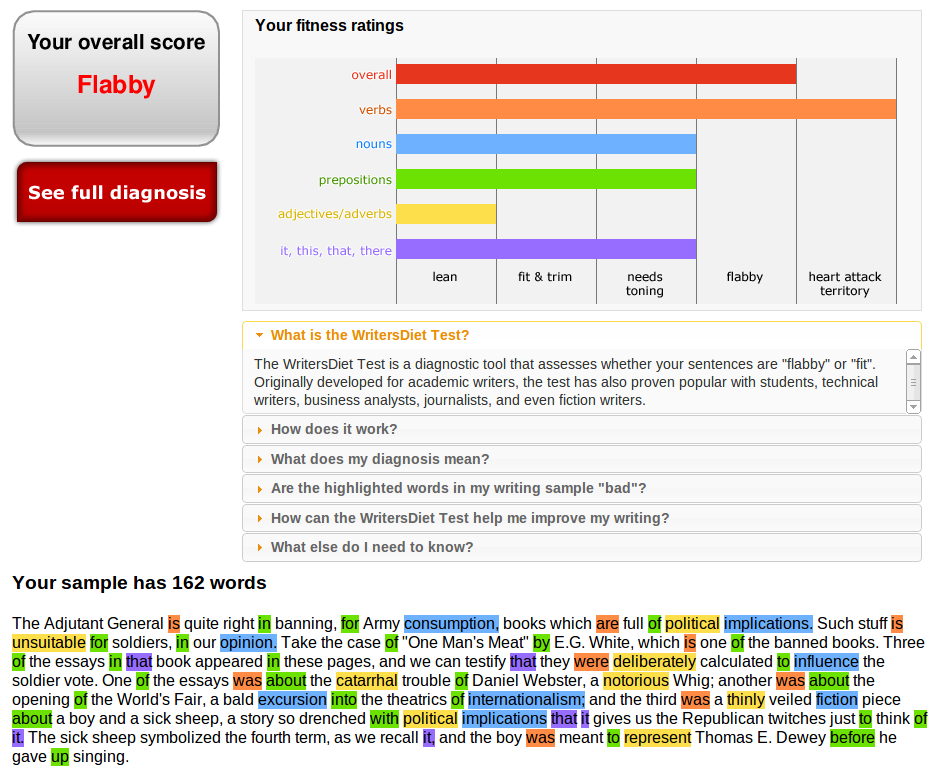
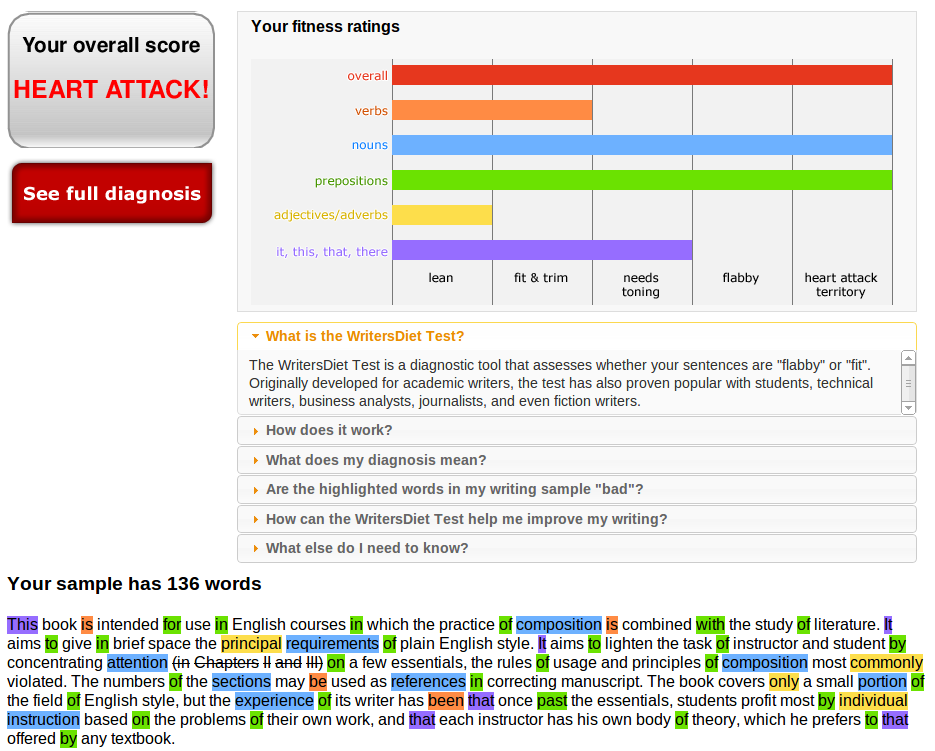
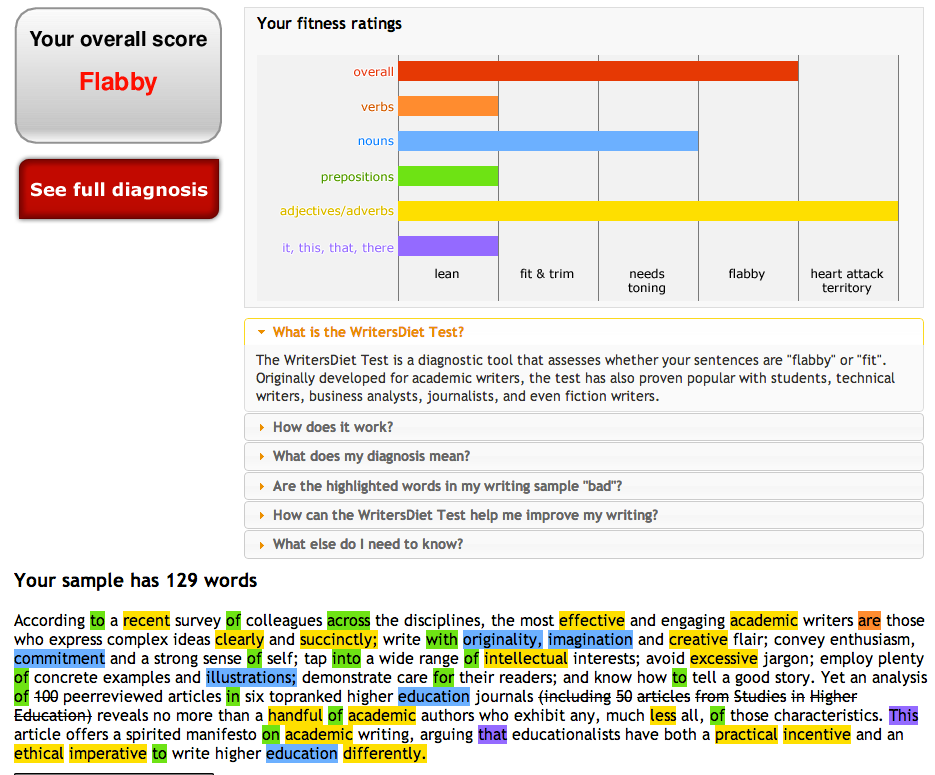
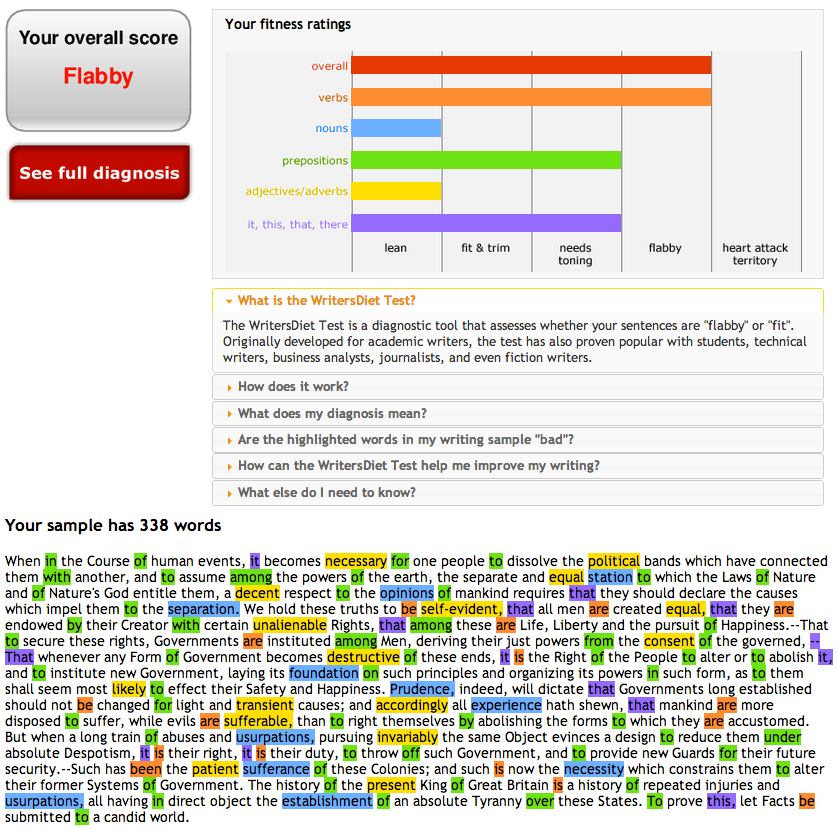
Mike Aubrey said,
December 2, 2012 @ 1:48 pm
The answer from the prescriptivist in response to this kind of data is that it is only *after* you have learned "the rules" and gotten sufficient writing experience under your belt that you can go ahead and start breaking those "rules."
Of course, when its okay to break a rule and when it isn't, nobody knows seems to be able to articulate…and such acceptable breaking of rules is never taken into account when grading English papers…
[(myl) But there are no rules — even Zombie Rules — that any of these passages break. The problem, from this moronic program's point of view, is apparently White's use of forms of "to be".]
Anthony said,
December 2, 2012 @ 2:20 pm
I ran two samples of George Orwell's "Politics and the English Language" through the test. The first three paragraphs of the essay, before Orwell's first examples, and then the 5 examples he holds up as the epitome of bad writing.
Orwell's own writing was rated "heart-attack territory" overall, and for verbs and "it, is, that, there", while scoring lean on nouns and prepositions, and "needs toning" on adjectives/adverbs.
The examples of bad writing, scored as "flabby" for verbs, and overall; while scoring "needs toning" for nouns, and "fit and trim" for the rest.
[(myl) Indeed:
]
Wesley Kerfoot said,
December 2, 2012 @ 2:49 pm
I ran a few samples of Bertrand Russel's writing through it from "In Praise of Idleness", and they both scored "Flabby". I also ran through the second paragraph of http://www.stephenjaygould.org/ctrl/ayer_metaphysics.html and got "Heart Attack". I really do not think this algorithm identifies anything that could be representative of quality prose. It might be a useful tool to identify certain parts of speech that *might* be representative of "flabby" or "heart attack" writing, but I think it should be configurable, just like the many "linting" programs people use for programming. I'm willing to bet a pseudo-random number generator could predict quality writing with about the same level of accuracy.
I realize the site itself says that a bad score doesn't necessarily mean your writing is poor, but then why use the different ratings at all? Why not just give the frequencies and let the user interpret it in whatever way they feel fit?
[(myl) Or, since the things this test is measuring have nothing whatever to do with the quality of writing, why not just ignore it completely?]
Geoff Nunberg said,
December 2, 2012 @ 3:53 pm
Let's try the beginning of a Raymond Carver story:

Who knew?
Matt said,
December 2, 2012 @ 4:45 pm
Has anyone run her own article through it yet?
Would be curious to see if this is another case of "do as I say", or if she actually follows her own strange advice.
I would do it myself, but I am using a phone without cut and paste.
[(myl) Here are the results for the abstract of her article "Writing higher education differently: a manifesto on style", Studies in Higher Education 34(3) 2009:
]
Henning Makholm said,
December 2, 2012 @ 4:46 pm
Looks like an undercover campaign for E-Prime?
Jeroen Mostert said,
December 2, 2012 @ 4:51 pm
The first paragraph of Edward Bulwer-Lytton's novel "Paul Clifford" gets the test's approval as "fit & trim". The novel is, of course, best known for its opening sentence, which begins "it was a dark and stormy night".
If this emperor has clothes, they are surely as royally purple as the prose it seems to favor.
Jerry Friedman said,
December 2, 2012 @ 4:58 pm
@Matt: I can't do it. We were in the same poetry class (or classes) in college. She was a good poet, I thought.
M.N. said,
December 2, 2012 @ 5:01 pm
I don't own these books, so I had to Google around a little for a quote that was longer than 100 words:
(The picture is cut off in the preview — here's hoping it will work.)
The way to beat this thing seems to be to use very simple sentences and words of mostly Anglo-Saxon origin. But then, that's also apparently the way to sound like Eragon.
M.N. said,
December 2, 2012 @ 5:02 pm
Didn't work. The address of the image is http://dl.dropbox.com/u/1886170/N%C3%A4ytt%C3%B6kuva%202012-12-02%20kohteessa%2016.49.58.png
Jeroen Mostert said,
December 2, 2012 @ 5:23 pm
Thinking that perhaps it wasn't fair to run the test on fiction, I fed it the first three paragraphs of Chapter 5 of Sipser's "Introduction to the Theory of Computation", which I hope any student of computer science would agree is an excellent book. The sample contains no mathematics. The outcome was predictably "flabby".
Overall, this seems to indicate this test has merit if you interpret the outcome properly. The "leaner" your prose is, the more success you'll have as a writer of airport novels. Conversely, "flabby" is reserved for people who actually have something to say.
Brian said,
December 2, 2012 @ 5:29 pm
I ran the full text of "The Cat in the Hat" and it came back "fit & trim." I ran a similarly sized excerpt from Nabokov's "Speak, Memory" (the pinnacle of prose) and it was diagnosed "flabby."
Rubrick said,
December 2, 2012 @ 6:41 pm
While I haven't bothered to transcribe it and put it to the test, I suspect that this (IMO brilliant) Onion TED Talk parody would score quite well: http://www.youtube.com/watch?v=tom6_ceTu9s
Also, while I fully agree with the "malarkey" assessment of this software, I have to say I've always felt that the Declaration of Independence gets off to a stylistically weak start. "When in the course of human events, it becomes necessary…" — this is not how to perk up a reader's ears.
[(myl) Well, the Bill of Rights also tests as Flabby:
And likewise the King James version of Genesis:
]
Jeroen Mostert said,
December 2, 2012 @ 7:09 pm
@Rubrick: I think "1776" (the musical) had a neat justification for this by making the writing of the entire Declaration just something to stall for time while unanimity for the vote on independence was arranged. Of course, that's not how it actually happened, but it still seems safe to say it wasn't so much intended to make the reader "perk up their ears" but rather to most gently and unobjectionably introduce the topic of, well, open rebellion. "The King is a tyrant and we intend to secede" woud be the start of a very different Declaration indeed.
Faith said,
December 2, 2012 @ 7:37 pm
I ran an article I wrote for a general-audience magazine through it, and got "Fit and Trim". An assignment for a graduate course "Needs Toning" while a paper shortly to appear in a peer-reviewed journal is a "Heart Attack." Seems like the message is, complexity is bad?
Boudica said,
December 2, 2012 @ 7:57 pm
I didn't look at this in depth, but I noticed in the Helen Sword sample that handful, incentive, and imperative are highlighted yellow as adjectives even though they are nouns in their sentences.
[(myl) Whoever wrote the app apparently couldn't be bothered to hook up one of several available free software POS taggers, but just relied on some crude heuristics based on final (and maybe initial) substrings. Of course, since the basic theory of stylistic analysis is nonsense to start with, there's no reason to think that a better implementation would work any better.]
Rebecca said,
December 2, 2012 @ 8:09 pm
i wonder if this is geared towards student writing, i.e. designed to catch the most horrible beginner style? I just ran several examples of writing from 9-11 year olds. The ones that I considered to be decent writing for that age were judged well by the program too: either lean or fit & trim. The ones that were really beginnerish (somewhat incoherent and repetitive) were judged flabby.
[(myl) My impression: this is geared towards selling copies of Ms. Sword's book.]
I don't think in terms of counting parts of speech, and, of course, a few samples don't show anything. But perhaps the algorithm correlates better with beginner styles than that of more mature writers. I've got access to quite a few pieces that have been scored by humans (different scale, of course). Maybe I'll find time to run them through.
Observation said,
December 3, 2012 @ 6:44 am
In my opinion, the software may also view poor writing favourably. One possible reason is that poor writing is marked by the lack of vocabulary. I have received a 'lean' rating on an extremely poor piece of writing.
http://www.uploadhouse.com/viewfile.php?id=16983500
Griblet said,
December 3, 2012 @ 7:25 am
I did a couple of soliloquies from Shakespeare … "Is this a dagger …" from Macbeth scored "fit & trim"; "Alas, poor Yorick" from Hamlet needs toning; and "All the world's a stage" from As You Like It, is positively lean. Implications: all us flabby academics (yes, my work is flabby) must all start hamming it up!
leoboiko said,
December 3, 2012 @ 7:32 am
Can we get an LL review of her book? Pretty please?
Michael Cargal said,
December 3, 2012 @ 11:28 am
I scored flabby on verbs, too, as did most people above. The PDF said this was because I used too many 'be" verbs, which makes it sound to me like a crochety old guy objecting to the fact that other people have different taste than he does.
Kathleen said,
December 3, 2012 @ 1:51 pm
This is a fun (if completely meaningless) toy. I do not know what world I am living in where the Gospel according to John, Lincoln's Second Inaugural Address, and John F. Kennedy's "Ich Bin ein Berliner" speech are all rated "Flabby" but the first 500 words of my dissertation are "Fit and Trim!"
chris said,
December 3, 2012 @ 5:50 pm
One thing that jumps out is that the main "offender" in most of the bad ratings for good writing is the copula, which, sure enough, she actually does avoid quite assiduously in her own writing (the program dings her in other areas instead).
Whether shunning the copula is likely to produce better writing is left as an exercise for the reader. (Although, oddly, Sword's one use of the copula in the sample given easily *could* be eliminated: you could simply drop "are those who" and the rest of the sentence would work just as well and weigh in three words leaner. I wonder if she has undergone special training in copula-free writing.)
Ray Dillinger said,
December 4, 2012 @ 4:01 am
So how does the American-Lit epitome of lean, spare writing score? Has anyone tried this tool on Hemingway?
Kathleen said,
December 4, 2012 @ 5:38 am
Hemingway's short story "The Snows of Kilimanjaro" comes up "Flabby."
» Why Didn’t I Think of That? The Blue Candle Society said,
December 4, 2012 @ 6:39 pm
[…] and I ran a few authors through it to see how they measured up. But I never thought of running old E.B. White, of Elements of Style fame, though the test. The results are about what you'd expect. So the question becomes, was E.B. White a bad […]
G.H.R. said,
December 7, 2012 @ 10:54 am
From the FAQ [http://www.writersdiet.com/WT.php?faq]:
Q. I ran the WritersDiet Test on a passage by my favorite author, and it came out "flabby." Doesn't this mean your test is flawed?
A. I developed the test to help stodgy academic writers write more clearly and energetically. Many fabulous pieces of prose will receive scores of "flabby" or even "heart attack" on the test, because stylish writers have the confidence and skill to play around with language in ways that the WritersDiet Test is not designed to evaluate.